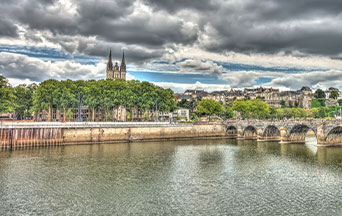
The year 1867 was the eighteenth centenary of the martyrdom of the Apostles Peter and Paul. Pius IX took advantage of the occasion to emphasize the Church’s universality and the unity between the worldwide episcopate and the Holy See. At the same time, the pope was under attack by liberals throughout Europe, threatened with the plundering of the Papal States, and betrayed by Napoleon III. Pius decided to summon bishops and faithful from all over the world to attend the commemorations. Fifty-three cardinals, nearly five hundred bishops, ten thousand priests, and a multitude of pilgrims from every country gathered in Rome.
During one of the solemnities, the Holy Father announced his intention to convene an ecumenical council. The news took everyone by surprise. It had enormous repercussions. Three centuries had passed since the Council of Trent (1545-1563). To many, it seemed impossible to bring the Fathers of the Church together again.
Eternal and Natural Law: The Foundation of Morals and Law
Soon after the publication of the encyclical Quanta Cura and the Syllabus of Errors in 1864, Pius IX secretly consulted some bishops about the advisability of calling a Council. But that secret was well kept. The idea that a universal council was not feasible was so deeply rooted in people’s minds that no one thought the pontiff intended to convene one. However, one year after the 1867 celebrations, Pius IX published the Bull of Indication, designating December 8, 1869, to open the Vatican Council’s work.
The first reaction of Catholics was one of festive joy. Finally, the Holy See showed its strength and power, even though it was trodden underfoot, politically persecuted and opposed, even by some of its children. After the first moment of euphoria, however, difficulties began to appear.
No one doubted that the infallibility of the pope and the Syllabus would be the dominant issues of the Council. The differences that divided Catholics on these grounds would inevitably become evident. Certain anecdotes concerning the attitude of the faithful in Rome during the commemorations of the martyrdom of the Holy Apostles were significant. During the celebrations, both the Editor of l’Univers, Louis Veuillot, and Bishop Felix Dupanloup of Orleans received visitors from all over. Everyone wanted to know the opinion of the undisputed leaders of Ultramontanism and liberal Catholicism. The director of the Spanish Catholic newspaper Lealtad (Loyalty), Father Sanchez, was introduced to Bishop Dupanloup. In his characteristic fever to win supporters, the bishop immediately asked Father Sanchez what his orientation was. The priest’s response was precise and forceful: “I am all Veuillot and not at all Dupanloup.”
At first, liberal Catholics were apprehensive and wanted to prevent the Council from becoming a trial of their ideas. To this end, they tried at all costs to stifle open disputes about the Syllabus and infallibility. They hoped that, since these were no longer matters for discussion, they would not be subjects of deliberation within the Council.
 Learn All About the Prophecies of Our Lady of Good Success About Our Times
Learn All About the Prophecies of Our Lady of Good Success About Our Times
The Count de Montalembert, however, did not understand his friends’ silence. Sick and bedridden after a carriage accident that left him with eighteen wounds, he used the intervals between bandage changes to write to everyone, especially Bishop Dupanloup. The Count urged the Bishop to intervene and impose a liberal program on the Council and the Holy See. Alarmed by his friend’s fiery temper, the Count of Falloux tried to reassure him by clearly expounding the liberals’ tactics.
“Moderation is the order of the day in the Council’s preparatory work. The pope himself reportedly said recently: ‘They say that the Syllabus must be kept in the shadows, for if addressed, the Bishop of Orléans’s seasoning would prevail.’ Therefore, dear friend, let us hope that this patience so costly to you more than anyone else and to us will be worth its cost and be soon rewarded by one of those strokes of light and grace that illuminate the whole history of the Church.
“A council cannot proclaim [infallibility] without defining it and cannot define it without limiting it. If a solemn definition is given, all these childish exaggerations will be reduced to nothing: the word ex cathedra will be explained and will have its conditions and laws.”
Montalembert was not the only one who did not understand the prudent attitude of the French liberal Catholics. German theologians—who despised Holy See teachings to the point of saying, “Doctor romanus, asinus germanus,” [A Roman doctor, a German donkey], also deemed French liberal reaction rather weak. Convinced that the Council would hear them, the Germans began treating infallibility and liberalism with an aplomb that delighted Montalembert.
However, in early 1869, the Jesuits at Civiltà Cattolica published an article saying:
“No one is unaware that, unfortunately, the Catholics of France are divided into two parties: some are simply Catholics, while others call themselves liberal Catholics. Catholics believe that the Council will be very short. They expect it to proclaim the doctrines of the Syllabus with affirmative formulas and negative propositions with their necessary developments. They will welcome with joy the proclamation of the Sovereign Pontiff’s dogmatic infallibility. No one is surprised that, out of a sense of righteous reserve, Pius IX does not want to make a proposition that seems to refer to him directly. But it is to be hoped that, through the mouth of the Ecumenical Council Fathers, the unanimous manifestation of the Holy Spirit will define it by acclamation.”
10 Razones Por las Cuales el “Matrimonio” Homosexual es Dañino y tiene que Ser Desaprobado
Civiltà Cattolica’s unofficial character gave this article a very wide reception. From then on, it was no longer possible to avoid public discussion of these matters, despite the efforts of Bishop Dupanloup and his friends. The great debate that preceded the Vatican Council had begun.
Photo Credit: © mehdi33300 – stock.adobe.com

